Backcountry camping is one of the most affordable and satisfying ways to explore the wilderness of British Columbia.
It can, however, be difficult to know where to start, especially if you’re new to BC.
This post will take you through how park-based backcountry camping works in British Columbia, breaking down the details, differences and reservation systems of both provincial and national parks.
It also includes all the important info (and dates!) you need to book British Columbia’s ‘reservation only’ backcountry adventures, from epic paddling trips like the Bowron Lake Canoe Circuit and Broken Group Islands to world famous hikes like the West Coast Trail and the Rockwall Trail.
If you’re looking to camp in the frontcountry (vehicle accessible campgrounds), we have another post with all the details.
Last updated November 2023

Important to know
Backcountry campgrounds are accessed by hiking, cycling, paddling or horse riding. Campers must bring all supplies with them to be self sufficient.
There are other ways to go backcountry camping in British Columbia, but this post concentrates on organised campgrounds within provincial parks and national parks only.
If you’re planning a backcountry trip, be sure to:
- Leave No Trace to help keep the wilderness wild
- Take the 10 Essentials
- Understand the principles of keeping safe
- Know how to avoid negative bear encounters
Going backpacking for the first time? Read my Backpacking 101 guide!
Backcountry camping in BC’s Provincial Parks
British Columbia has the third largest park system in North America, with over 600 provincial parks.
Around a third of provincial parks have established visitor facilities, with 2000+ backcountry campsites across these.
The provincial park system is administrated by BC Parks. In many areas, the operation of the actual parks is contracted out to third parties.
Workers for those third parties are called Park Facility Operators (PFOs). Due to this contract system, the quality and maintenance of backcountry campgrounds can vary between parks.
Size and facilities of backcountry campsites are always different, so it’s best to consult each park’s website page. Click the ‘Facilities Available’ tab and then read the ‘Walk-In/Backcountry/Wilderness Camping’ section.
BC’s Provincial Parks are completely free to visit, with no parking or admission fees.

Backcountry permit system
Most provincial park backcountry campgrounds have a nightly fee in the form of a backcountry permit. This is charged at a per person, per night rate (typically $5-10).
There will usually be a fee vault at the trailhead or in the campground. It works on an honesty system most of the time, but remember that the funds help maintain the parks we use.
If you don’t want to carry cash, there is the option to pay camping fees in advance using BC Parks’ backcountry registration system. This online service is currently available for 32 different parks.
Please note that a backcountry permit is not a reservation and therefore does not guarantee a campsite.
First come, first serve backcountry campgrounds
The vast majority of BC Parks’ huge network of backcountry campgrounds operate on a first come, first serve basis.
First come, first serve backcountry campgrounds operate exactly how they sound. Securing a spot at a campground is as simple as arriving and claiming a tent pad or space.
As mentioned above, some parks charge overnight fees for camping in the form of a backcountry permit. These can be paid online in advance or with cash on the day of your trip.
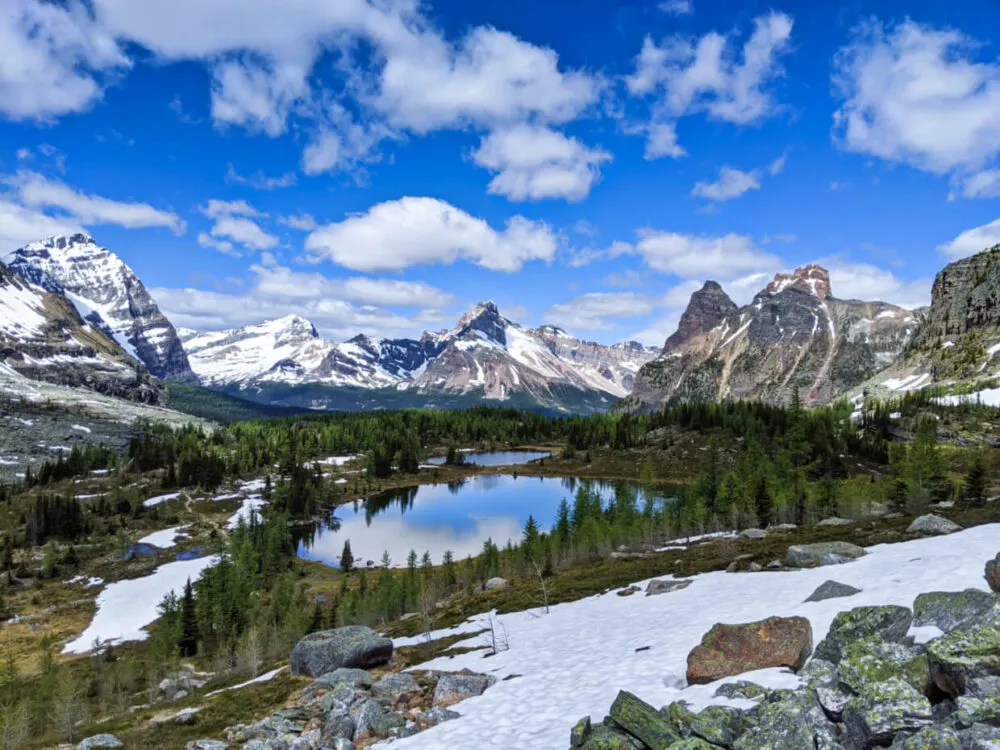
Wilderness/random camping
Backcountry camping is usually only allowed in designated backcountry campgrounds. In some parks, however, it is possible to camp randomly in specific areas with no overnight fee.
There are no facilities and campers are expected to follow Leave No Trace principles at all times. Advanced skills in wilderness travel and camping are also required.
BC Parks backcountry camping reservations
The most popular provincial backcountry campgrounds and multi-day experiences must be reserved via BC Parks’ camping website – click the ‘backcountry camping’ tab then ‘backcountry reservation.’
There are six provincial parks with ‘reservation required’ trips:
- Mount Robson Provincial Park (Berg Lake Trail)*
- Mount Assiniboine Provincial Park (Magog and Og Lake)
- Garibaldi Provincial Park (ten campgrounds)
- Joffre Lakes Provincial Park (Upper Joffre Lake campground)
- Bowron Lake Provincial Park (Bowron Lake Canoe Circuit)
- E.C. Manning Provincial Park (Buckhorn, Kicking Horse and Frosty Creek campgrounds only)
For the backcountry areas listed above, having a reservation is mandatory. There are no standby spots available for campers who arrive without a reservation.
Some of the campgrounds have on-site PFOs who will check the reservations of campers. The remaining campgrounds are regularly visited by PFOs.
Having a reservation guarantees a spot in the selected campground, but does not a specific tent pad. These are allocated on a first come, first serve system.
*BC Parks has confirmed that the Berg Lake Trail will not be fully open until at least 2024
Reservation tips
- Although it is possible to use the camping call centre to make a booking, I would recommend using the online service if you can. There’s a price surcharge and getting through can be very difficult
- If you don’t already have a reservation account, be sure to sign up prior to reservation launch day to save time (and stress!)
- Take some time to play around with the reservation system to ensure you know what to do on the day
- July and August the most popular months, with weekends always being busier (especially holiday weekends)
- Be flexible with your dates (prepare to compromise) and have multiple options and itineraries ready. Prepare to compromise if needed but remember that cancellations are possible too
- Reservations are held for 15 minutes until confirmed. So if you arrive on the system just after launch and all the sites appear to be gone, wait 15-20 minutes and you may well see some spots open up
- It is possible to book for your entire multi-day trip in one booking (e.g. three nights at Garibaldi Lake)
Cancellations
Reservations get cancelled all the time. It’s worth regularly checking the BC Parks’ reservation system for cancellations.
An alternative idea is to use a service like Campnab, which will check for cancellations for you. Campnab automatically scans cancellations and sends a notification when a site is available
For the Bowron Lake Canoe Circuit and Berg Lake Trail*, it is also possible to check for cancellations in-person. Availability isn’t likely during peak camping season (July/August) so you may need to wait a long time for a cancellation to come up.
*BC Parks has confirmed that the Berg Lake Trail will not fully re-open until 2025
Reservation-only BC Provincial Park backcountry trips
Here are the most in-demand backcountry trips in BC’s Provincial Parks, with all the important details you need to know to reserve.

Berg Lake Trail
The Berg Lake Trail is a 23km hiking trail (with 800m elevation gain) showcasing thundering waterfalls, magnificent old growth trees and a number of soaring mountain peaks. The latter includes Mount Robson, the highest in the Canadian Rockies.
And, of course, the finale is Berg Lake itself. Named after the pieces of ice that calve off the glacier above and float on the surface of the water, Berg Lake sparkles brilliant blue in the sun.
There are seven backcountry campgrounds located along the Berg Lake Trail, with the Berg Lake Campground being the biggest (26 tent pads) and most sought-after to reserve. Most hikers spend 3-5 days on the trail.
Due to its moderate difficulty, approachable length (46km return) and proximity to Jasper National Park, the Berg Lake Trail is exceptionally popular and reservations go very quickly every year.
Essential details
When to go: Operating season is 15th May to Thanksgiving (mid October), reservable dates are 15th June to 30th September
When to reserve: Unfortunately, the Berg Lake Trail was flooded after the heat dome event in late June 2021. It will not fully re-open until 2025
How to reserve: Online or by phone 1-800-689-9025
Reservation fees: $6 per tent pad, per night, up to $18 per stay $5 sucharge for phone reservations
Camping fees: $10 per person, per night
Good to know: Be sure to have your preferred itinerary and dates ready on reservation launch day, although you should be ready to make adaptations as availability disappears
Read Next: Happiest Outdoors’ Guide to the Berg Lake Trail

Mount Assiniboine Provincial Park
Located between Banff and Kootenay National Parks, Mount Assiniboine Provincial Park is host to some of the most glorious alpine scenery in the Canadian Rockies.
Often called the ‘Matterhorn of the Canadian Rockies,’ the pyramidal-shaped peak of Mount Assiniboine is as striking as it is beautiful. But reaching Mount Assiniboine (and the subalpine paradise around it) is an adventure in itself.
Most visitors spend two days hiking one of three routes across the border from Alberta. Strong hikers can complete the trek in a day. Alternatively, you can also fly in on a helicopter.
The most popular campground is at Magog Lake, located just below Mount Assiniboine. Since 2018, reservations have been required to stay here (and also at Og Lake, 5km away) from 26th June to 30th September.
Please note that most of the campgrounds on the way to Mount Assiniboine Provincial Park are located in Banff National Park and are available to reserve via the Parks Canada reservation system instead (usually from January onwards).
Essential details
When to go: Open year round, but mid July to late September is peak season
When to reserve: In 2024, reservations will likely operate with a four month rolling reservation window as they did the previous year e.g. if you want to arrive on July 25 and stay four nights, you can reserve all four nights starting at 7am PT on March 25
How to reserve: Online or by phone 1-800-689-9025
Reservation fees: $6 per tent pad, per night to a maximum of $18 per stay plus $5 surcharge for phone reservations.
Camping fees: $10 per person, per night (Magog and Og Lake only)
Good to know: Magog Lake has a lodge and huts as accommodation options, as well as a campground
Read More: Complete Guide to Hiking to Mount Assiniboine

Garibaldi Provincial Park
Garibaldi Provincial Park is a vast expanse of wilderness bordering the Sea to Sky Highway from Squamish to Whistler and beyond. There are over 90km of hiking trails taking in towering mountain peaks, turquoise glacial lakes and more.
With many of the hike trailheads being within two hours drive of Vancouver, Garibaldi is a very popular year round alpine destination.
Consequently, reservations are required to camp in any of Garibaldi’s designated backcountry campgrounds.
There are nine year round backcountry campgrounds in Garibaldi Provincial Park:
- Wedgemount Lake (20 campsites)
- Cheakamus Lake (8 campsites)
- Singing Creek (6 campsites)
- Helm Creek (30 campsites)
- Garibaldi Lake (50 campsites)
- Taylor Meadows (40 campsites)
- Elfin Lakes (35 campsites)
- Rampart Ponds (12 campsites)
- Russet Lake Campground (20 campsites)
In addition to these, there is the winter-only Red Heather campground (15 campsites) as well as the Elfin Lakes Shelter (33 people, currently closed).
Essential details
When to go: Operating season is year-round, but expect winter conditions from October to June. The warmer months are most popular (June to September)
When to reserve: In 20243, reservations will likely operate with a four month rolling reservation window as they did the year before e.g. if you want to arrive on July 25 and stay four nights, you can reserve all four nights starting at 7am PT on March 25
How to reserve: Online or by phone 1-800-689-9025 plus $5 surcharge for phone reservations
Reservation fees: $6 per night to a maximum of $18 per stay
Camping fees: $10 per person, per night
Good to know: Garibaldi Lake is the most popular campground in the park – getting a spot can be a very competitive process!
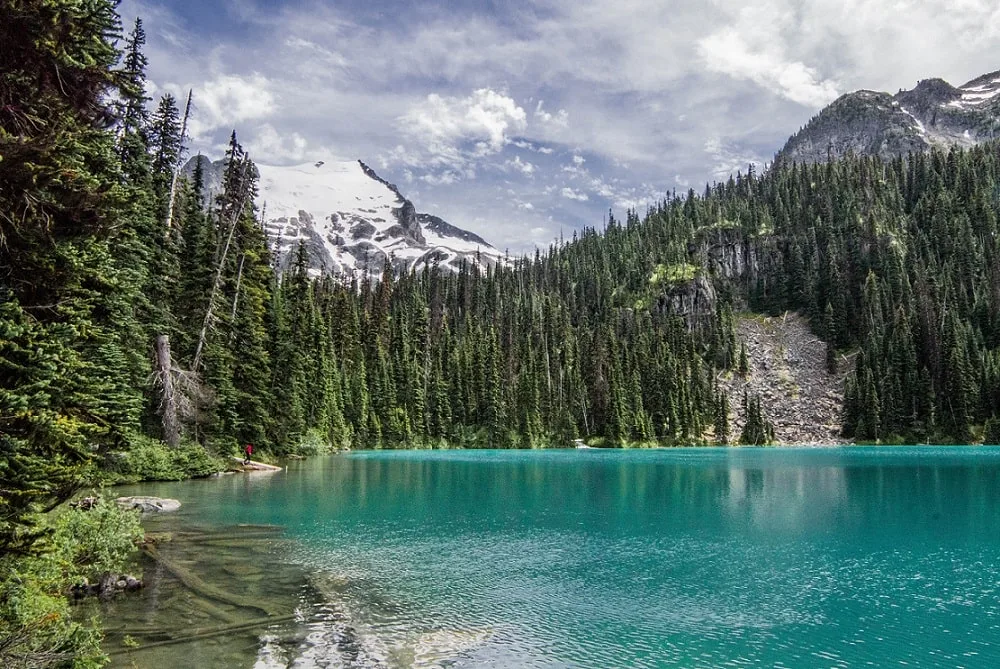
Joffre Lakes Provincial Park
Joffre Lakes Provincial Park is best known for a chain of three strikingly beautiful, turquoise lakes backdropped by glaciers. Located just an hour north of Whistler, Joffre Lakes is one of BC’s most popular provincial parks.
Since 2019, advance reservations have been required for the 26 site designated campground situated at the south end of Upper Joffre Lake. It is a 5.5km one-way hike (with 400m elevation gain) from the parking lot.
While it is possible to hike to all three lakes year round (conditions permitting), the campground is not open in winter due to avalanche risk. The best time for camping at Joffre Lake is during the warmer months, from June to September.
While Joffre Lakes is always busy, weekends are still the busiest period. Saturday is the most in demand night to camp.
Essential details
When to go: Operating season is 15th April to 1st November
When to reserve: In 2024, reservations will likely operate with a four month rolling reservation window as they did the year before e.g. if you want to arrive on July 25 and stay four nights, you can reserve all four nights starting at 7am PT on March 25
How to reserve: Online or by phone 1-800-689-9025
Reservation fees: $6 per tent pad, per night to a maximum of $18 per stay plus $5 surcharge for phone reservations
Camping fees: $5 per person, per night
Good to know: Joffre Lakes is always busy (even with the new day pass system) so be sure to arrive early in the day to enjoy some solitude on the trail
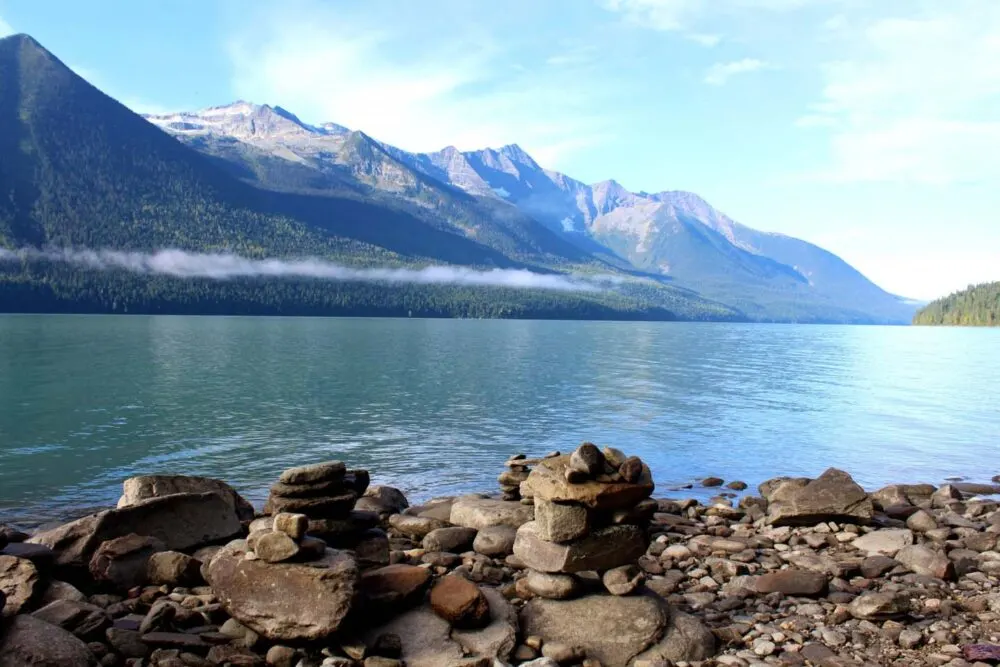
Bowron Lakes Canoe Circuit
The Bowron Lakes Canoe Circuit is a geographical wonder – a perfect parallelogram of lakes, rivers and portages surrounded by temperate rainforest and imposing mountains, forming a 116km paddling route.
Along the way are 54 designated campsites around the circuit, each offering a unique perspective of this beautiful wilderness area in BC’s Cariboo region.
Open to both canoeists and kayakers, the Bowron Lakes Canoe Circuit is the most popular paddling destination in BC.
For this reason, only a limited number of vessels can launch on the circuit each day. Reservations are essential during the busiest months of July and August.
Even with such popularity, the Bowron Lakes Circuit still presents ample challenge. Carrying a heavy canoe and gear along the eight portages can be notably tricky, especially when muddy. Isaac Lake is the longest on the Circuit (almost 40km) and typically takes two days of steady paddling to finish.
Most paddlers complete the circuit in six to eight days. There is an option to just paddle the ‘West Side’ of the Circuit, which features shorter portages and smaller lakes.
Essential details
When to go: 2024 operating season is 15th May to 28th September
When to reserve: The reservation launch date for the 2024 season is 24th October at 7am PDT. On this date, it is possible to reserve for starting dates during the entire 2024 operating season
How to reserve: Online or by phone 1-800-689-9025 plus $5 surcharge for phone reservations
Reservation fees: $18.00 per vessel (canoe/kayak)
Camping fees: $60 per person for the full circuit, $30 for the west side only
Good to know: Parties exceeding 6 people in size must book as a group and are required to camp at designated ‘Group Campsites.’
Read More: Complete Bowron Lakes Canoe Circuit Guide
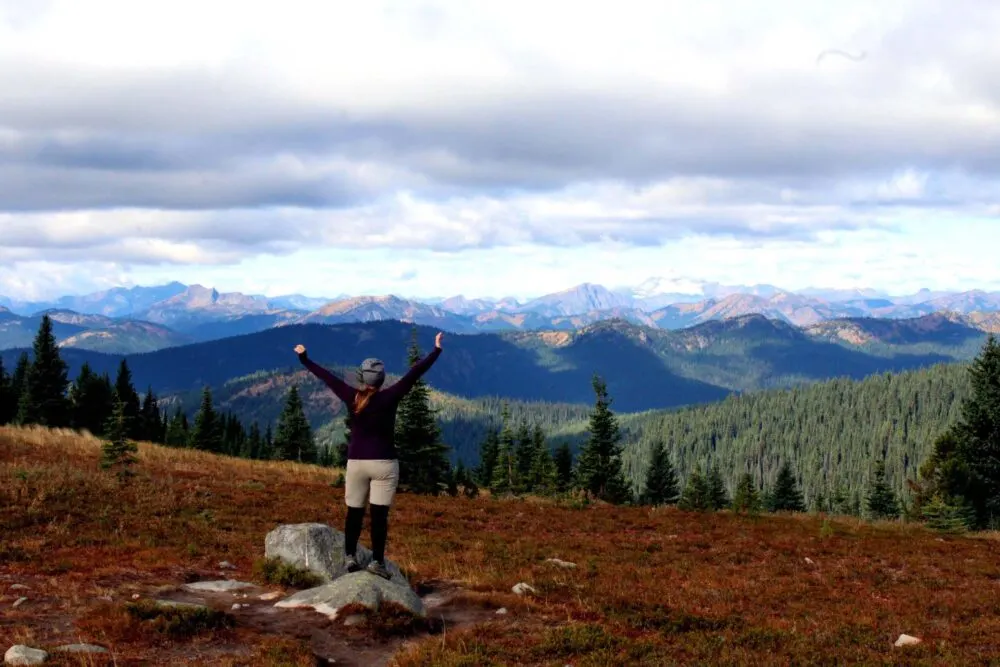
E.C. Manning Provincial Park
The Heather Trail is one of British Columbia’s premier backpacking paths, offering huge rewards for relatively little effort.
Starting at elevation of 1980m, beautiful wildflower meadows and mountain views can be seen right from the parking lot! For this reason, the Heather Trail is an ideal first time backpacking trip.
One of the most popular places to camp along the 44km out and back route is Buckhorn campground, located 4.5km from the Lower Parking Lot and 3.5km from the Upper Parking Lot.
While there aren’t any spectacular vistas on offer from the campground itself, Buckhorn is the perfect destination for first time backpackers or hikers with young children. Buckhorn also acts an a good overnight stop for anyone getting a late start on the trail.
Essential details
When to go: Reservations are required 30th June to 3rd September
When to reserve: In 2024, reservations will likely operate with a four month rolling reservation window e.g. if you want to arrive on July 21 and stay four nights, you can reserve all four nights starting at 7am PT on March 21
How to reserve: Online or by phone 1-800-689-9025
Reservation fees: $6 per tent pad, per night to a maximum of $18 per stay plus $5 surcharge for phone reservations
Camping fees: $5 per person, per night
Good to know: The road to the trailhead usually opens in early July, often in time for the Canada Day long weekend
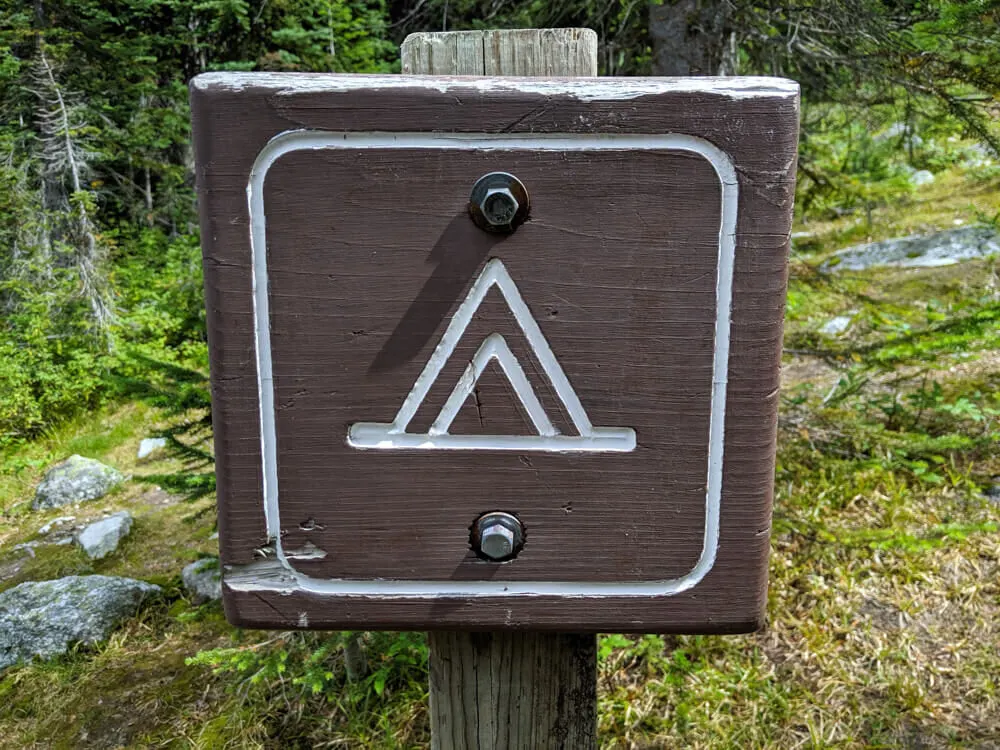
National Park backcountry camping
British Columbia hosts five National Parks:
- Pacific Rim National Park located on the West Coast of Vancouver Island
- Mount Revelstoke National Park located adjacent to Revelstoke
- Glacier National Park located between Revelstoke and Golden
- Yoho National Park located between Golden and the Alberta border
- Kootenay National Park located between Radium and the Alberta border
There are a number of backcountry campgrounds in each park, all requiring campers to have a valid Wilderness Pass. In addition, some of the campgrounds require advance reservations to secure a spot.
National Parks are administered by Parks Canada. Each park charges a daily admission fee.
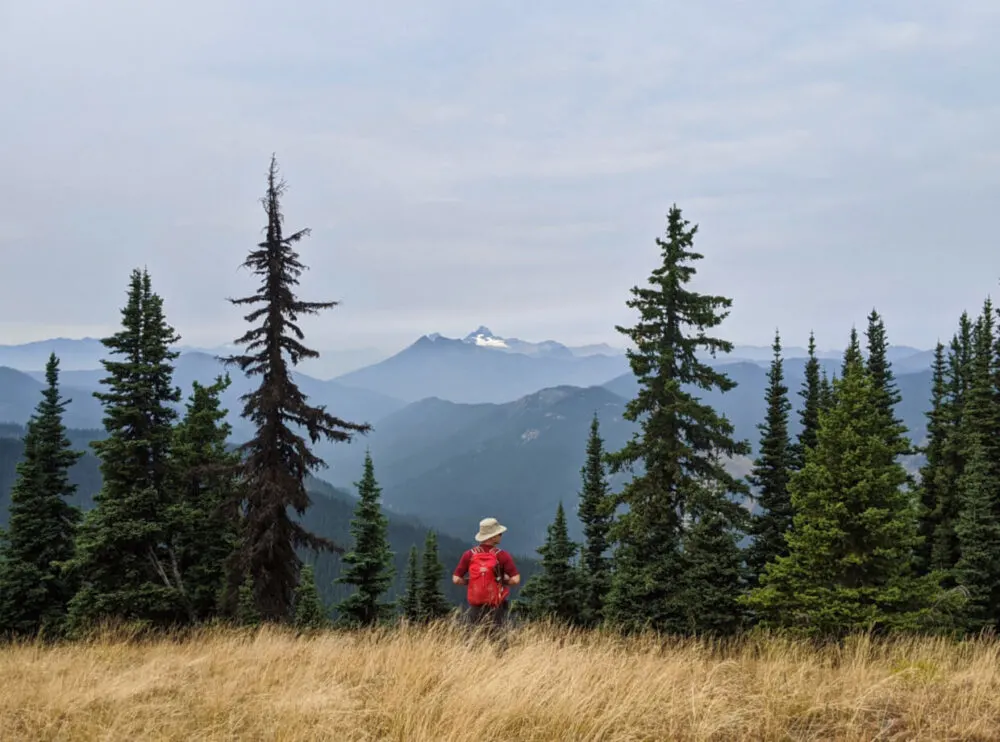
Wilderness Passes
A Wilderness Pass is required for overnight trips in the backcountry of National Parks.
There are a limited number of Wilderness Passes for each backcountry campground, so once you secure one, you are guaranteed a campsite in a specific campground.
In addition to the Wilderness Permit fees for overnight camping, there are daily National Park admission fees as mentioned above.
First come, first serve backcountry campgrounds
Campgrounds not on Parks Canada’s reservation system are allocated ‘first come first serve,’ but you still need to acquire a Wilderness Pass on the day of departure (or the day before) from a Parks Canada location.
This is the system in place at the following backcountry campground:
- Sir Donald (Glacier NP)

National Park backcountry camping reservation system
Most designated National Park backcountry campgrounds in BC use a reservation system, typically opening in January of each year.
Reservation launch dates for each backcountry area are listed on the Parks Canada website.
Popular backcountry campgrounds are usually reserved for the entire summer hiking season as soon as the reservation system opens. This is true for these four backcountry areas and trails:
- Lake O’Hara in Yoho NP
- The Rockwall Trail in Kootenay NP
- The West Coast Trail in Pacific Rim NP
- Broken Island Group in Pacific Rim NP
These backcountry areas are therefore ‘reservation-only.’ If you don’t manage to secure a reservation, you’ll have to try for a cancellation.
The following backcountry campgrounds are on Parks Canada’s reservation system but do not (usually) immediately sell out:
- Yoho Lake in Yoho NP
- Laughing Falls in Yoho NP
- Twin Falls in Yoho NP
- Little Yoho in Yoho NP
- McArthur Creek in Yoho NP
- Verdant Creek in Kootenay NP
- Eva Lake in Mount Revelstoke NP
- Jade Lake in Mount Revelstoke NP
If you don’t have a reservation for these campgrounds, you can visit the local Parks Canada Visitor Centre in person and check for availability on the day of your intended departure.

Reservation tips
- Although it is possible to call to make a booking, I’d recommend using the online service instead. It’s notoriously difficult to get through to the call centre
- Be sure to sign up for an account prior to the reservation launch day to save time and stressTake some time to play around with the Parks Canada reservation system to ensure you know what to do on the day
- Weekends are always busier (especially holiday weekends), and July and August the most popular months
- Be flexible with your dates and have multiple options/itineraries ready. Prepare to compromise if needed but remember that cancellations are possible too
- On launch day, log in to the reservation system prior to the opening time. Users are held in an online waiting room to prevent server overload. At launch time, users are then randomly assigned a place in line to access the website

Cancellations
Reservations get cancelled all the time. It’s worth regularly checking the Parks Canada reservation system for cancellations.
An alternative idea is to use a service like Campnab, which will check for cancellations for you. Campnab automatically scans cancellations and sends a notification when a site is available
As a last resort, you can also travel to the relevant park and check in person at the Visitor Centre. This is, however, pretty unlikely so it’s important to be prepared to be disappointed. Hope for the best, prepare for the worst!
Reservation-only National Park backcountry trips
Here are the most in-demand backcountry trips in BC’s National Parks, with all the important details you need to know to reserve.

The West Coast Trail
The West Coast Trail (WCT) is British Columbia’s most famous multi-day adventure.
Located on Vancouver Island in Pacific Rim National Park, this 75km long coastal hike follows ancient First Nation paths along the remote and rugged Pacific coastline. Beautiful sandy beaches, pristine waterfalls, old growth forests and epic sunsets await!
There are two main trailheads – Pachena Bay (near Bamfield) and Gordon Bay (near Port Renfrew).
There is also a mid point entrance at Nitinaht Narrows. Only a limited number of hikers can start the West Coast Trail each day from these trailheads.
Despite its popularity, the West Coast Trail is still a serious undertaking. Most hikers take 6-8 days to complete the route, which also includes intensely muddy forest sections, slippery boardwalks, steep climbs and over 100 ladders!
Essential details
When to go: Operating season is 1st May to 6th October
Reservation required? Yes. The WCT has operated on a reservation-only system since 2018 (no standby availability)
When to reserve: In 2024, the WCT reservation launch date is 22nd January at 8am PT
How to reserve: Online or by phone 1-877-737-3783
Reservation fees: $25.75 per person
Other fees: $160.00 trail fee, $56.00 ferry fees, daily Park Pass
Good to know: The southern end of the WCT is harder. Some like to hike this section first to get it over with, while others prefer to wait until their pack is a bit lighter at the end of their trip!
Read More: Complete West Coast Trail Guide

The Broken Group Islands
A marine archipelago of more than 100 small uninhabited islands with an incredibly rich intertidal zone, the Broken Group Islands are a paddler’s paradise. Think spectacular coastal views, fascinating tidal pools, beautiful sandy beaches, serene sunsets and abundant wildlife.
The Broken Group Islands are located in Barkley Sound in Pacific Rim National Park, south of Ucluelet.
Like the West Coast Trail, access to the Broken Islands is strictly controlled to protect the natural and cultural heritage of the area. The islands contain many sites of spiritual and cultural significance for local First Nations.
Designated camping areas are situated on seven different islands, with limited tent spots available. Maximum stay at each camping area is 4 nights.
Essential details
When to go: Operating season is 1st May to 31st October
Reservation required. Yes, from 1st May to 30th September
When to reserve: In 2024 the Broken Islands launch date is 19th January at 8am PT
How to reserve: Online or by phone 1-877-737-3783
Reservation fees: $11.50 online, $13.50 by phone (per stay)
Camping fees: $13.50 per person, per night
Good to know: There are kayak tour operators offering trips to the Broken Group for visitors without kayaking experience and/or required equipment.
Read More: Sea kayaking experience in the Broken Group Islands (by HikeBikeTravel)
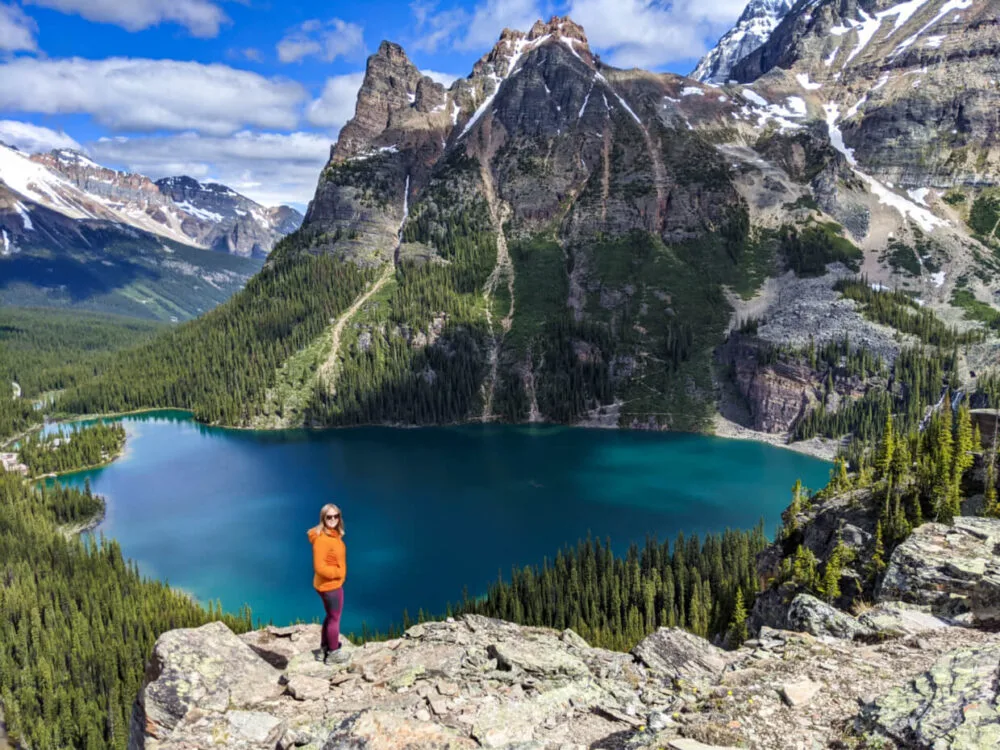
Lake O’Hara
With pristine turquoise lakes, cascading waterfalls, soaring mountain peaks, giant glaciers, hanging valleys and more, Lake O’Hara is one of the most beautiful places in the Canadian Rockies. An impressive network of hiking trails crisscross this spectacular landscape.
Lake O’Hara is part of Yoho National Park and is protected by strict daily visitor allowances. The cheapest way to stay overnight is to book a spot at the 30 site backcountry campground, just a short walk from Lake O’Hara itself.
Being so popular, it’s only possible to reserve a maximum of three nights camping here. Even if you manage to secure just one night though, it’s absolutely worth the effort!
During regular seasons (i.e. not 2020), a bus transports day visitors and campers from the parking lot up the 11km access road, so you can just day hike in this impressive area.
If you’d like to know more about visiting Lake O’Hara overnight or on a day trip, please see the link below for a guide with all of the details.
Essential details
When to go: Operating season is 21st June to 5th October, my recommendation is late July to early September
Reservation required? Yes. There is no standby availability
When to reserve: The 2024 reservation launch date for overnight camping at Lake O’Hara is 25th January at 8am MT
How to reserve: Online or by phone 1-877-737-3783
Reservation fees: $11.50 online, $13.50 by phone (per stay)
Camping fees: $13.50 per person, per night plus $22.00 return bus trip per person
Good to know: Reservations open on Mountain Time, NOT Pacific Time. Be sure to have your selected campsite number ready on reservation launch day.
Read More: Complete Lake O’Hara Camping and Hiking Guide

The Rockwall Trail
The Rockwall Trail is a 55km long multi-day hike in Kootenay National Park. A combination of individual hiking trails creates a horseshoe-shaped route, most of which is backdropped by a massive limestone cliff (the eponymous ‘Rockwall.’)
Besides the impressive Rockwall itself, other highlights include meadows filled with wildflowers, waterfalls, three mountain passes, hanging glaciers and more. The Rockwall Trail is often cited as one of the premier hiking experiences in the Canadian Rockies.
Most hikers take around 4-5 days to traverse the entire Rockwall Trail. It is possible to hike in either direction, but I recommend north to south.
The trailheads of the Rockwall Trail are 13km apart so it is necessary to organise transportation between them (bike, two-vehicle shuttle system, hitchhike etc.)
Essential details
When to go: Mid July to October
Reservations required? Yes. There is no standby availability
When to reserve: The 2024 season reservation launch date for Rockwall Trail campsites is 29th January 2024 at 8am MT
How to reserve: Online or by phone 1-877-737-3783
Reservation fees: $11.50 online, $13.50 by phone (per stay)
Camping fees: $13.50 per person, per night
Good to know: Reservations open on Mountain Time, NOT Pacific Time. Be sure to have your preferred itinerary and dates ready on the day
Read More: Complete Rockwall Trail Hiking Guide
Looking for some more backcountry trip inspiration?
25 of the Best Overnight Backpacking Trips in British Columbia, Canada
West Coast Trail Alternatives: Best Coastal BC Backpacking Trips
17 of the Best Canoe Trips in British Columbia

BC backpacking trail guides
Sunshine Coast Trail, Powell River
Cape Scott Trail, Cape Scott Provincial Park
HBC Heritage Trail, from Hope to Tulameen
Valhalla Provincial Park, near Slocan
Eva Lake Trail, Mount Revelstoke National Park
Monica Meadows, Purcell Mountains
Pinnacle Lake Trail, Monashee Mountains
Della Falls Trail, Strathcona Provincial Park
Heather Trail, Manning Provincial Park

Free printable backpacking checklist
Subscribe to our monthly email newsletter and receive a free PDF checklist for your next multi-day hiking adventure
We never share your information with third parties and will protect it in accordance with our Privacy Policy
Check out these recently published articles next

One half of the Canadian/British couple behind Off Track Travel, Gemma is happiest when hiking on the trail or planning the next big travel adventure. JR and Gemma are currently based in the beautiful Okanagan Valley, British Columbia, Canada

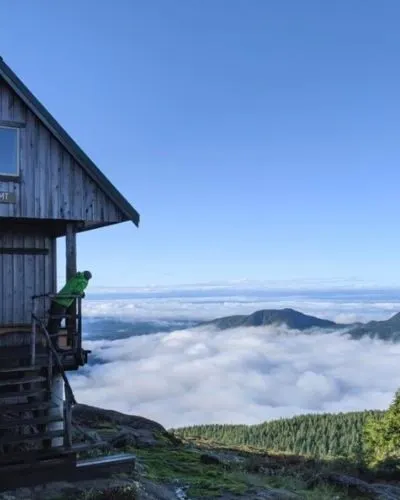

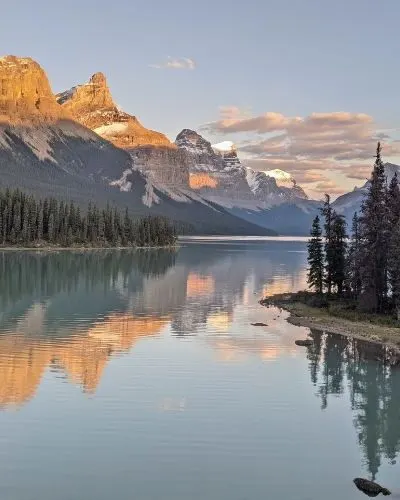
Jayden
Wednesday 27th of April 2022
This is such an excellent guide/resource!! Thank you!
Gemma
Thursday 28th of April 2022
Thank you so much for letting me know Jayden! Glad I could help.